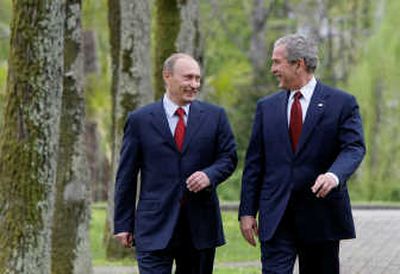Putin not budging on NATO expansion

SOCHI, Russia – President Bush made little, if any, progress with Russian President Vladimir Putin during a hastily arranged summit Sunday, dashing any near-term hopes of mending the strained relations between the two nuclear powers.
While Bush and Putin were friendly in their last meeting as heads of state, the day ended much as it began. The Russians remain firmly opposed to American efforts to expand NATO into the former Soviet republics of Georgia and Ukraine and to deploy a ballistic missile defense system in Poland and the Czech Republic, both former Soviet satellites.
The conference was capped by the release of a strategic framework, a roadmap of sorts, signed by Putin and Bush. The document was largely a series of previously agreed upon points, including:
•Weapons of mass destruction should not fall into the hands of terrorists
•Russia and the United States will continue to negotiate arms-control measures
•U.S.-Russia commercial relations should be strengthened
On the major issues that Bush had looked to improve upon, however – missile defense and NATO membership for Ukraine and Georgia – Russia didn’t budge.
“I want to be clear – our fundamental attitudes toward the American plans have not changed,” Putin said at a news conference when asked about the missile shield.
The Kremlin is convinced that the Americans want the system – a radar site in the Czech Republic linked to interceptor missiles in Poland – not to counter attacks from rogue states such as Iran, as it claims, but to help neutralize Russia’s nuclear arsenal.
The framework offered little hope for a shift in that stance, other than to say, “We agreed to intensify our dialogue after Sochi.”
Bush bristled when he was asked whether a non-binding document with no major announcements of progress was tantamount to passing the buck or “kicking the can” to the next administration.
“You can cynically say it’s kicking the can down the road,” he said, sounding irritated. “I don’t appreciate that.”
Putin called Bush’s unsuccessful push last week to expand NATO “a manifestation of old logic” from the Cold War and said it reminded him of something Winston Churchill said: “A fanatic is one who can’t change his mind and won’t change the subject.”
Bush has vowed to continue his efforts to expand NATO.
As happened last month, when Secretary of State Condoleezza Rice and Secretary of Defense Robert Gates visited Moscow to try to broker a deal, both sides mentioned measures offered by the Americans to assuage Russian fears, including Russian inspection of the missile sites, a guarantee that the radar won’t target Russia and a promise not to deploy the missiles until a threat is detected.
Putin said he’d much rather see a broader anti-missile system that linked Europe, Russia and the United States, giving equal access to each partner. Bush allowed for the possibility, but gave no specifics.
The day began with Putin and Bush exchanging pleasantries during a photo opportunity at Putin’s dacha in this Black Sea resort town.
It was clear, however, that beneath the friendly public banter, serious tensions continue to plague U.S.-Russia relations in a way not seen since the Cold War.
Kremlin sympathizers say U.S. activity in Eastern Europe appears to be a revival of the Cold War containment strategy – closing Russia off from Europe by expanding NATO and deploying a missile defense near its borders.
Russian analysts critical of the Kremlin brush off that sort of reasoning, saying that Putin has manipulated Russia’s lingering confusion over the 1991 collapse of the Soviet Union, and the financial meltdown of 1998, to convince Russians that his administration’s heavy-handed tactics are necessary in the face of a Western threat.